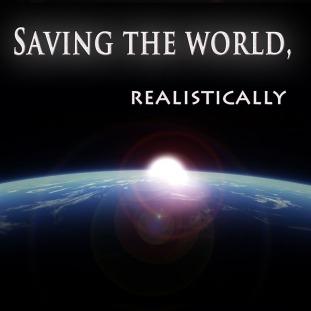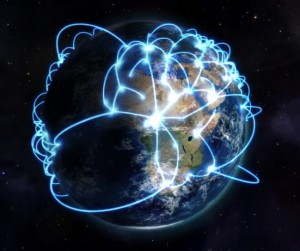
I’m lucky: I’m not struggling for survival. I’m not crying myself to sleep out of loneliness or heartbreak. My most important needs are met. That gives me time to worry about other people’s problems. As well we all should: many of them will affect us all.
You’ve probably noticed: the world is in sad shape. No one would deny it—although the debate rages on about who and what to blame. But while the filibustering drones on, the standard of living for much of the world’s population is going down, and so are people’s expectations. Peace is in jeopardy in many places; resources are ever scarcer and higher in price; the weather is going haywire…. What can a person do? It’s unconscionable not to act, but we can’t afford to act foolishly. With problems so pressing, we need to focus on what will really work.
My friends and I have looked at this very carefully. We’ve considered every approach we’ve heard of, and every approach we could think of, to improve the world’s prospects and reduce the world’s suffering. We could not escape this conclusion: apart from people just plain being unselfish, every other solution we could think of was unsatisfactory.
Most proposals for “saving the world” suggest better ways of doing things, new or improved forms of international cooperation, and the like. Such changes and systems are good—and heaven knows, they are necessary. But heaven knows, too, how much the results of everything depend on people more than systems. As powerful free will creatures, we human beings should never think a good idea or an improved structure can, in and of itself, save us. How disappointed we would be!
Consider the many cases where people have taken a wonderful system and made it unworkable. Here’s a simple but telling example: the “honor system.” Why don’t we rely on that beautiful principle more often? It’s become unreliable, because selfishness has become more popular than honor these days.
Throughout history, narrow self-interest has defeated mankind’s best-laid plans, despite their theoretical promise and merit. One by one, so many great social movements, so many hopeful structures have been brought down by selfishness, laziness, and greed.
Communism and socialism are good, idealistic systems, but they failed because, without strong self-interest incentives, selfish people won’t exert themselves for the common good. Capitalism, too, is now failing, because greed and self-interest have overshadowed the positive values that could have kept it viable: strong human values; healthy self-sacrifice; and intelligent, far-sighted resource-management. Even democracy is failing, because the people have given too much power to their leaders, and participated too little in steering the ship. The examples go on and on: selfishness routinely degrades otherwise positive opportunities.
To be realistic about helping the world, we must realize the extent to which selfishness creates the woes we wish to fix—and even sabotages all our attempts to fix them. For example: When people try to give financial aid to third world countries, selfishness interferes at every turn. Greed, bribery, stealing, and corruption block progress at all levels of government, clear down to the local level. Interpersonal bickering and lack of cooperation among the recipients of aid has undermined water projects, agricultural projects, every kind of charitable benefit project, the world round. It’s maddening… and tragic.
I still actively support many good causes and promising solutions. We need to solve the problems on all levels on which they exist. But I know every solution will eventually hit the wall until selfishness bites the dust. Until we effectively reduce self-orientation itself, both individually and collectively, selfishness will continue to undermine attempts to bring about planetary harmony, or even population stability, here on earth.
Who among us is willing to pay the real cost of a right and beautiful world? The real cost is unselfishness; real caring; true cooperation and self-sacrifice—in short, less ego. If we fool ourselves that our ideals, our values, and our visions could work without effectively reducing our selfishness, we’re cruisin’ for a bruising.
To make the needed difference, we’ve got to be more than humanitarian. It is good to give a penny at the cash register, to contribute to Save the Whales, to pray for victims of famine and war, to meditate for world peace. All these things are good and necessary. But we must know, too, that impersonal forms of giving transcend selfishness to only a very small degree. Charity, unfortunately, is like removing twenty percent of a virulent tumor. To make the needed difference, we need to personally incorporate ongoing ego-transcending practices into all parts of our daily life. For example, to cooperate smoothly instead of insisting on our own way; to listen to someone else’s exciting idea before blurting out our own; to recognize and accommodate another person’s needs. Then, we’ll be helping save the world, whether our lives look conventionally “humanitarian” or not.



